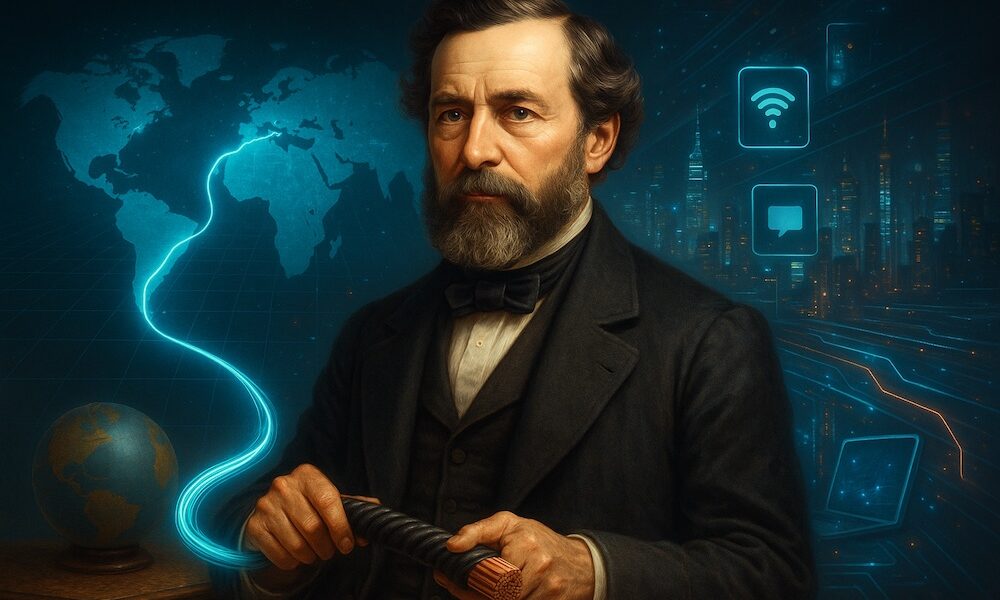In our second People feature, we shine the spotlight on Cyrus W. Field, a bold innovator from the 1800s who took on a huge, seemingly impossible task and in doing so paved the way for the globally interconnected world we digital nomads take for granted today
Long before digital nomads came into being… there was a wire.
A single, relatively fragile thread of copper laid across the depths of the Atlantic Ocean that changed human connection forever.
The birth of the future digital revolution began with this copper thread and a bold mission.
And at the heart of that bold, world-shrinking mission? A soft-spoken paper tycoon named Cyrus West Field, a man who wouldn’t take no for an answer.
From paper boy to power player
Born in 1819 in Stockbridge, Massachusetts, Cyrus W. Field wasn’t your typical inventor.
He didn’t have a laboratory or a scientific pedigree.
What he had was vision and hustle. By age 30, Field had made his fortune in the paper business and retired a wealthy man.
But boredom wasn’t in his vocabulary. Instead, he set his sights on something so wildly ambitious, it left most people laughing him out of the room: laying a telegraph cable across the Atlantic Ocean.
The undersea cable that couldn’t be done
At a time when messages between Europe and America could easily take ten days or more by ship, Field imagined a future where they could travel in ten seconds.
His dream? A transatlantic telegraph cable connecting North America to Europe, uniting continents in real time for the first time in history.
But the journey from imagination to reality was anything but smooth sailing.
The first attempt in 1857 failed. So did the second. And the third. And the fourth.
Millions of dollars lost, cables snapped mid-ocean, and public ridicule followed him like a storm cloud.
Field’s ambition earned him nicknames ranging from “The Cable Maniac” to “The Most Persistent Man in America.”
But Field? He didn’t quit.
The fifth time was the charm
On July 27, 1866, after nearly a decade of setbacks and heartbreak, Cyrus W. Field finally did it.
The first successful, permanent transatlantic telegraph cable was completed. Messages that once took weeks could now be done in hours.
Queen Victoria sent a congratulatory telegram to US President James Buchanan.
Early messages were difficult to decipher and this particular 98 word telegram took 16 hours to make it across the Atlantic Ocean.
While that seems like an eternity today, when we can send a photo or document in seconds, it was something of a big deal then!
The world would never be the same after this achievement.
Cyrus W. Field had brought the world closer—literally.
A legacy that still echoes today
Today, we take instant global communication for granted. A quick WhatsApp message, a Teams call, a viral TikTok post crossing borders in seconds—all of it traces back to the bold dream of one man and one rather long cable.
Field didn’t just lay wire; he laid the foundation for the Internet, for global business, and for the interconnected world we now live in as digital nomads.
Even more impressive? He did it without seeking fame or fortune.
After the cable’s success, Field quietly returned to private life. No victory tour. No patents.
Just the satisfaction of knowing he had changed the course of human history.
Timeline: The epic journey of the first transatlantic telegraph cable
1854 – Cyrus W. Field is introduced to the idea of a telegraph line to Newfoundland, but his vision grows much bigger.
1857 – First attempt to lay a transatlantic cable ends in failure after 380 miles.
1858 – A temporary success! The cable works—for about three weeks—before it breaks. The public turns skeptical.
1865 – Another failure. The cable snaps and sinks. Many investors back out.
July 27, 1866 – Victory at last! The Great Eastern ship successfully lays the first permanent transatlantic cable from Ireland to Newfoundland.
1870s and beyond – Telegraph cables crisscross the globe, shrinking the world in ways never before imagined.
Why the work and efforts of Cyrus F. Field matter so much today
In an era obsessed with innovation, start-ups, and moonshots, Cyrus W. Field’s story is a powerful reminder: vision, perseverance, and grit can connect the world—literally.
So next time you FaceTime across continents or send an email to a client on the other side of the globe, take a moment to thank the man who made that moment possible.
He didn’t need a smartphone. Just a wire, a dream, and the courage to keep going when the world said “impossible.”
Fun facts you probably didn’t know about Cyrus W. Field & the cable that changed the world
Miley funded it with hustle: Field raised millions (in 1800s dollars!) from British and American investors, including bankers, engineers, and even politicians.
Nature wasn’t too kind: Early cables had to withstand deep-sea pressure, cold temperatures, ship tangles, and even curious sea creatures.
The cable was HUGE: The 1866 cable was over 2,300 miles long, weighed nearly 1 ton per nautical mile, and took weeks to painstakingly lay.
The speed? Shocking.: The first message in 1858 took 17 hours to transmit. By 1866, it was down to minutes.
Cyrus was practically a ghost: After his success, Field avoided the spotlight. No social media victory lap here.
Cyrus W. Field: The man who wired the world
Cyrus W. Field was the OG of global connectivity, and proof that sometimes, the most powerful network starts with just one connection, and the most audacious undertaking often begins with a single audacious idea. Bravo Mr Field!


